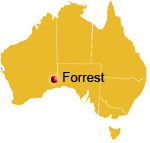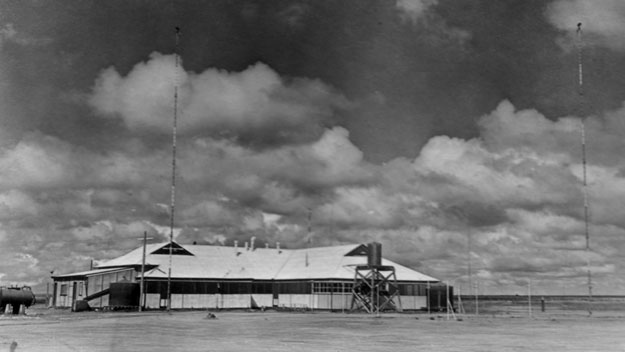
In 1928 West
Australian Airways (WAA) constructed a hostel at Forrest, WA, a remote
fettlers' settlement on the trans-continental railway across the Nullarbor
Plain, to provide an over-night stopping place for the new Perth-Adelaide
air service. The hostel was designed to accommodate about 20 people (passengers
and staff). Although WAA was taken over by Adelaide Airways in 1936 (and
shortly afterwards incorporated in the new Australian National Airways),
the buildings remained and were taken over by DCA
at about that time.
Part of the hostel later became the Aeradio station. The photo above was taken by DCA Radio Inspector Ivan Hodder in February 1942. It shows the hostel as seen from the rear, looking toward the aerodrome movement area. A large hangar, also constructed by WAA, is out of shot to the right. In front of the hostel can be seen the red-and-white antenna masts for the Aeradio station's HF radio receivers. At that time Forrest was an important staging post for aircraft flying to and from the logistics bases in the eastern States to Australia's north-west in support of the evacuation of civilian and military personnel from the Duch East Indies (today, Indonesia).
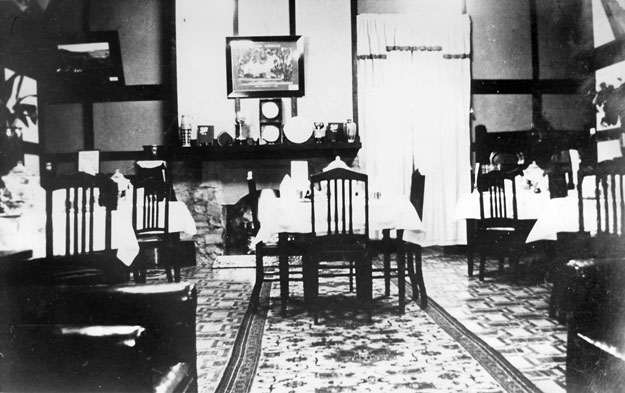
The photo above shows the interior of the WAA hostel during its early years. A description of the hostel and life there was given in a brochure provided to WAA passengers describing their trip, titled On Airways Magic Carpet Across Australia:
At Forrest.
To render anything like justice to what awaits Airways' passengers at Forrest would tax a far more descriptive pen than mine. It is a masterpiece of forethought and organisation, conceived on bold lines and carried out with a degree of thoroughness and efficiency that is almost uncanny. The result is a twentieth-century reproduction of the quails-and-manna miracle of Scriptural history - a first-class hotel, replete with every modern convenience, in the very heart of the wilderness.
...As we reach the floor we are welcomed one by one by the manageress of the hostel. On her shoulders the responsibility seems to sit lightly. To her this is not work, but pleasure. She admits it. We follow our hostess from the hangar, noting that the baggage truck has already begun to perform its allotted task. By a wide, shrub-bordered, concrete path she conducts us to the main entrance of the long, single-storey bungalow to which the term "hostel" is, one thinks, somewhat of an affront. Here she assumes the role of chatelaine, and shows each passenger to his or her room. She indicates, too, the bathrooms which, by the way, are sewered, and announces that dinner will be served in a quarter of an hour. The baths are of porcelain.
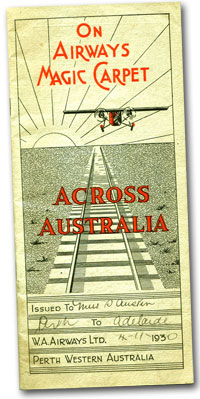
Along the carpeted corridor I enter my room, draw aside the portieres and open the long French windows. From the wide verandah, with its spacious canvas-backed armchairs, I survey a cheerless landscape. Full moon rising in a starry sky. A mile across the plain one tiny light flickers. It is the railway siding at Forrest. Endless expanse of flat Nullarbor limestone to every horizon. Not a sound to break the deathly stillness of the autumn dusk. Not a blade of grass. We have landed in country on which, for hundreds of miles, there is not enough vegetation to support a solitary rabbit.
Quiet Comfort in Central Australia.
I step back into my room. What a contrast! It is large, airy, electric-lighted. A gaily patterned carpet covers its floors. Its furniture is modern, having been built some 750 miles beyond this desert outpost. There are wardrobe (with coat-hangers), chest of drawers, dressing table (with bronze ashtray, candlestick and book-matches), wash-handstand with toilet set complete (a fresh cake of Airways' soap for each guest), a large fleecy bathtowel on the rack, beside a smaller one; comfortable armchairs, a capacious springy bed with snowy, newly-ironed linen - all of the best quality. As food and accommodation are included in the cost of the passenger's ticket (the through fare, by the way, is only £18), it would be permissible for the air service contractor to have secured less expensive appointments for its guests' one-night quarters. But we are fast learning that, in the view of our hosts, only the best and most comfortable is good enough for Airways' patrons. They come again. By some invisible agency my suit-case, which I had last handled in Adelaide before breakfast, stands here at my bedside.
The lounge and restaurant are sumptuous. They are worthy of any capital city hotel. Momentarily one forgets the vast wilderness beyond the blue portieres that conceal it. Shaded lights illuminate the room. They hang, in costly inverted bowls, from a raftered ceiling. The floor is expensively carpeted. Large leather settees and saddlebag chairs abound. From panelled walls the scene is further brightened by a collection of framed colored drawings and prints. Pedestals bearing pot-plants in jardinières fill odd corners. A large cabinet gramophone, with extensive repertoire, flanks the wide fireplace. Speaking from memory, I believe I also noticed a radio set. Several tables, with the latest newspapers and periodicals, English and from all Australian States; air-borne, of course. Two well-equipped writing desks. Supplies of embossed Trans-Australian Airway stationery and "By Air Mail" labels. In one corner a bridge table. Facing each other on the walls are two clocks - Perth time and Adelaide time - registering a difference of 90 minutes. Flying West we ignore the latter, except to adjust our watches, and vice-versa. Half-past six in the Eastern States: eight o'clock at Forrest. Time to dine.
Cuisine at Forrest.
We seat ourselves about five small tables. Maids, uniformed in black, with snowy aprons, collars, cuffs and caps, present printed menu cards. Hungry air-travellers, who last ate at Ceduna six and a half hours ago, sit up and take notice. The menu (I have kept one as a memento) reads:
FORREST
HOSTEL.
TRANS-AUSTRALIAN AIRWAY.
DINNER.
SOUP.
Cream of Tomato.
FISH.
Fried Fillet of Whiting.
ENTREE.
Iced Asparagus.
POULTRY.
Roast Duckling and Apple Sauce.
JOINTS.
Roast Lamb and Mint Sauce.
Roast Mutton and Red Currant Jelly.
SWEETS.
Apple Pie and Cream. Fruit Salad and Cream.
Jellied Fruit.
Dessert. Cheese. Tea. Black Coffee.
Dinner over, I explain to the maitresse d'hôtel my mission. I should like to be permitted a peep behind the scenes. The request is willingly granted. We start with the kitchen. There are gadgets here which no mere male can fully appreciate. So far as I can see, it is a huge kitchen, such as, in one's own home, one is debarred admission to. It has an enormous range, or oven, or whatever they are called; and an array of utensils whose uses will, I hope, always remain a mystery to me. The ladies of the party are audibly impressed with the spotless cleanliness and labor-saving aspect of all that is shown them in this distinctively feminine realm. To me, the most impressive article of equipment is a gigantic Kelvinator which extends, from floor to ceiling, across the entire width of the kitchen. It has been constructed especially for Airways, and brought down into the oasis from Perth. Proudly it is opened for us, and there is displayed its refrigerated contents. Suspended from hooks are lordly sections of lamb, sheep, and other edible quadrupeds. Here, too, is poultry of various shapes, in the nude, which the ladies identify as chicken, duck, and so forth. Fresh fish. Vast stores of dairy produce, butter, cheese, milk. Sundry other liquids. Pyramids of fresh fruit and vegetables. Eggs. Our guide explains that all perishable supplies for the Hostel are brought by air from Perth and Adelaide. Those crisp rolls and loaves in the bread-locker have flown more than 750 miles from their bakery.
Behind the Scenes.
We pass to the storeroom. Our Cicerone unlocks a door and exhibits a small-scale Expeditionary Force Canteen. Enough canned and bottled food here to last apparently for years. The storeroom caters for every probable need of passengers of either sex. For the lady air-traveller there are powder-puffs, combs, Eau de Cologne, lipsticks, hairpins and other intimate toilet accessories. For the neglectful male there are safety razors, shaving brushes, collar studs, shoe laces, and numerous other objects frequently overlooked in the rush of packing for a trip. Of smokers' and photographic requisites there is abundance. Here, too, are stocks of confectionery and countless other articles which I omitted to note in detail.
We are shown more storerooms. Linen room, with its scores of pairs of brand-new sheets and piles of pillow cases, table cloths, towels, serviettes. Bedding room, with quantities of mattresses, bolsters and blankets. Stacked on edge against a cupboard wall is a big supply of folding beds. There are 16 bedrooms - single and double - for guests, apart from staff quarters. But occasionally as in last year's East-West race from Sydney to Perth, the Hostel's accommodation is taxed, and non-Airways' passengers given a shakedown for the night.
From the storerooms we are conducted through a model laundry, with electric washing and drying machines wringers, mangles, ironing-boards, and four electric irons. Here is laundered all bed and table linen. Here, too, is carried out minor service for passengers.
[click here to read about the technical side of the operation]
...Returning to the Hostel, I found the bridge party breaking up, the gramophone silent, and most of my fellow-passengers already retired, or about to retire, for the night. As the "Perth time" clock said 10 p.m., and breakfast was scheduled for 4.30, the example was a sound one to follow. I have never slept more comfortably.
An Early Start.
After what seems an absurdly brief interval, I wake to find a neatly-uniformed chambermaid handing me tea and announcing: "It's ten to four: breakfast at half-past." Five minutes later she re-enters, with a can of hot water and my newly polished shoes. Bathe, shave, dress, pack. At 4.20 another call. Baggage staff on the job. "If your suitcase is ready, sir, will you please leave it outside the door." I do so, and handle it no more until it is deposited in my hotel bedroom in Perth. A pleasing feature of Airways' policy is that as its guests we are relieved of all anxiety as to baggage, nourishment and rest. One reflects that it's nice to be wet wet-nursed in this manner, and to be addressed by a staff which neither expects nor accepts a tip for its manifold personal services.
Presently
a gong resounds throughout the Hostel. We assemble in the dining room,
everybody looking fit and bright and alert. In other parts of Australia
I have frequently, on a subsidised air service, been flown 300 odd miles
"on an empty stomach," and haven't liked it a bit. This is going to be
different. Waitresses hand round printed cards:
BREAKFAST.
Porridge. Grape Nuts. Weeties.
Stewed Fruit.
Fried Bream.
Lamb's Fry and Bacon. Veal Cutlets.
Lamb Chops. Grilled Steak.
Eggs and Bacon. Scrambled Eggs.
Boiled Eggs.
Toast. Marmalade.
Tea. Coffee. Cocoa.
Our hostess produces the Visitors' Book, which we gladly sign, inscribing in the "Remarks" column the grateful tribute which is Airways' due from each of its satisfied guests. I glance hurriedly through the hundreds of entries which have been made during the many months since the service was inaugurated. I am tempted to read on, and do so. Then a voice reminds me that it is nearly 5 o'clock - time to be moving off.
-oOo-
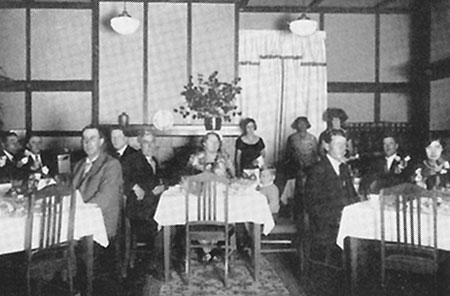
Back to the main Items of General Interest index
